Theorems of Perpendicular and Parallel Axis
Theorems of Perpendicular and Parallel Axis: Overview
This topic covers the theorems of parallel and perpendicular axes along with their proofs. It derives the formula to calculate the moment of inertia of a body moving about a parallel axis or an axis perpendicular to its plane.
Important Questions on Theorems of Perpendicular and Parallel Axis
State and prove (ii) perpendicular axes theorem.
State and prove (i) parallel axes theorem
From a triangular lamina of side a and mass , a small triangular Lamina made by joining mid-points of sides of triangular lamina is cut. If Moment of Inertia of complete Lamina about COM is and Moment of Inertia of remaining Lamina about centroid is , then find the value of .
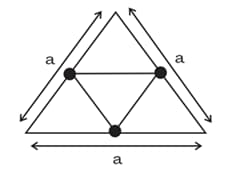
The moment of inertia of a ring about any of its diameter is two times the moment of inertia about the axis that is perpendicular to the plane of the ring and passing through its centre.
Find the moment of inertia of a ring of radius and mass about one of its diameter.
Find the moment of inertia of a uniform ring of mass and radius about a diameter. The moment of inertia about an axis perpendicular to the plane of the ring is .
The moment of inertia of a hollow cubical box of mass and side length , about an axis passing through centres of two opposite faces, is equal to . The value of is
The moment of inertia of a hollow cubical box of mass and side length , about an axis passing through centres of two opposite faces, is equal to . The value of is
The moment of inertia of a rigid body depends on:
The moment of inertia of a circular ring about an axis passing through its centre and perpendicular to its plane is . If the radius of the ring is , find the mass of the ring.
The moment of inertia of a rigid body depends on:
A lamina is made by removing a small disc of diameter from a bigger disc of uniform mass density and radius , as shown in the figure. The moment of inertia of this lamina about axes perpendicular to the plane of the lamina and passing through the points and is and respectively. If the ratio , where and are the smallest integers, then what is the value of ?
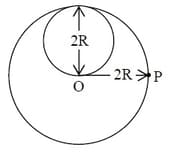
Four particles, each of mass are situated at the vertices of a square of side as shown in the figure. The moment of inertia of the system about line will be
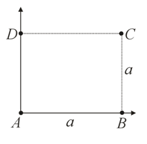
The moment of inertia about x-axis of uniform thin plate of density as shown in the figure is . then find the value of N.
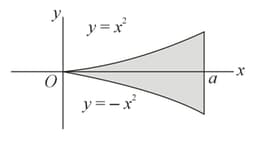
A lamina is made by removing a small disc of diameter 2R from a bigger disc of uniform mass density and radius 2R, as shown in the figure.The moment of inertia of this lamina about axes passing though O and P is IO and IP respectively. Both of these axes are perpendicular to the plane of the lamina.The ratio IP / IO to the nearest integer is
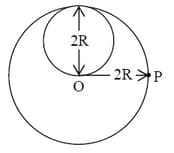
State an expression for moment of inertia of a uniform solid sphere about an axis of rotation coinciding with its diameter.
State an expression for moment of inertia of a solid cylinder of uniform cross section about
(i) an axis passing through its centre and perpendicular to its length.
(ii) its own axis of symmetry.
State an expression for moment of inertia of a ring about an axis passing through its centre and perpendicular to it.
State an expression for moment inertia of a thin uniform disc about an axis passing through its centre and perpendicular to its plane.
State an expression for thin uniform rod about an axis of rotation passing through its center and perpendicular to its length. Also deduce an expression for moment of inertia about an axis passing through its one end and perpendicular to its length.
